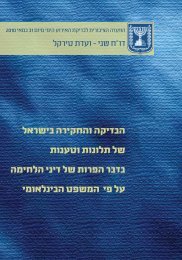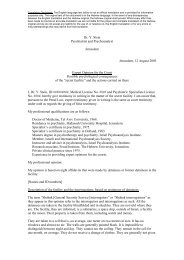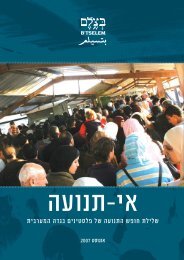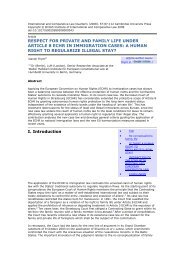HCJ 10650/03 Abu Gwella et. al v
HCJ 10650/03 Abu Gwella et. al v
HCJ 10650/03 Abu Gwella et. al v
Create successful ePaper yourself
Turn your PDF publications into a flip-book with our unique Google optimized e-Paper software.
effect on children, the defect could be rectified. L<strong>et</strong> the<br />
members of the committee now present to the Intern<strong>al</strong><br />
Affairs Committee of the Kness<strong>et</strong> what the direct or<br />
indirect effect is, and then it would not be necessary to<br />
r<strong>et</strong>urn the bill for first reading in the Kness<strong>et</strong> plenum.<br />
The Committee’s leg<strong>al</strong> advisor’s comments, like the Law itself, were ignored. The<br />
explanatory notes to the proposed bill do not mention the harm to children that will<br />
result from the bill. The harm to children was mentioned by Members of Kness<strong>et</strong> and<br />
representatives of human rights organizations during the Committee’s hearings, but<br />
not by the drafters of the bill. The only thing that the latter did was confirm, in the<br />
course of the hearings, that the bill indeed applies to children, but denied that it would<br />
harm them – for where there is no right, there is no infringement of a right. (See the<br />
comments of Attorney Mazuz, quoted in Section 83 above.) Drafters of the bill on<br />
beh<strong>al</strong>f of the Ministry of the Interior and the Ministry of Justice failed to provide<br />
figures and information on the subject, and relevant questions that were raised by<br />
Members of Kness<strong>et</strong> and invitees to the Committee remained unanswered.<br />
Unconstitution<strong>al</strong>ity of the Law and possible remedies<br />
136. At least as regards children, the Law is unconstitution<strong>al</strong> in that it fails to me<strong>et</strong> the<br />
requirements of the limitations clause of the Basic Law, and the process by which it<br />
was enacted was faulty to the core. This is not to say that it should not be nullified for<br />
other reasons and as regards other people, and those matters will be heard, as stated, in<br />
another framework.<br />
137. Having reached this conclusion, three remedies are available:<br />
A. The first possible remedy relates to Section 12 of the Entry into Israel<br />
Regulations. This section makes an unreasonable distinction and discriminates<br />
b<strong>et</strong>ween children born in Israel and children born outside of the country. This<br />
discrimination is especi<strong>al</strong>ly grave in light of the provisions of the Law,<br />
whereby the right of the former [children born in Israel] to receive a status is<br />
clear, while the latter, if born in the Occupied Territories, are not granted any<br />
status, not even following the exercise of discr<strong>et</strong>ion, in that the minister does<br />
not have authority to exercise discr<strong>et</strong>ion in their cases. This prohibition, s<strong>et</strong><br />
forth in the section [12] of the regulations, can be rectified by “red penciling”<br />
the words “born in Israel” from the wording of the regulation. This change in<br />
the wording of the regulation reflects, in practice, the Respondents’ policy<br />
over the years, when they arranged the status of children born in Israel and<br />
51









